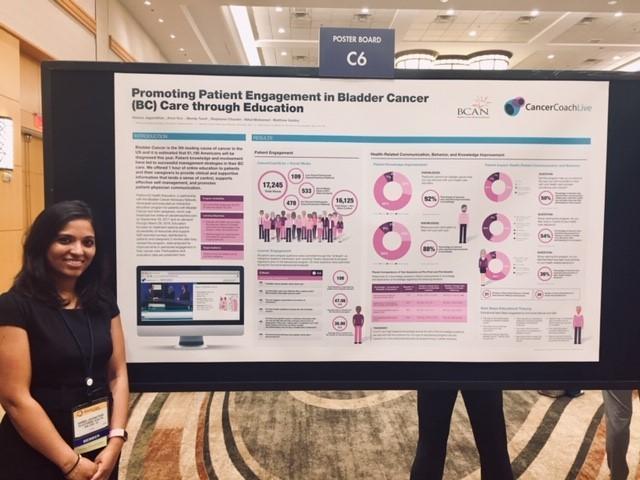
The 2018 ASCO Quality Care Symposium was held on September 28 and 29, 2018 in Phoenix, AZ, and PlatformQ Health was honored to present a poster session on the impact of online patient education for people with bladder cancer.
Promoting Patient Engagement in Bladder Cancer (BC) Care through Education features insights on an online educational initiative produced in partnership with Bladder Cancer Advocacy Network (BCAN), and highlights engagement strategies, educational design, and the impact of the program on patient knowledge, communication and behavior after participating in the educational program.
The educational initiative highlighted in the poster is part of a “tethered” educational initiative, or a set of complementary educational programs on a single topic – often, different programs within the set are designed to meet the educational needs of different stakeholders like HCPs or patients. The bladder cancer series reaffirmed The American Society of Clinical Oncology’s stance on the importance of a multidisciplinary, team-based clinical approach to care that emphasizes patients taking an active and informed role in treatment decisions. Stephanie Chisolm, Director of Education and Research at the Bladder Cancer Advocacy Network, emphasized the importance of education to accomplish this goal, noting, “Trustworthy and engaging education is a critical component when moving patients from those receiving care to active participants in their journey.”
“We were thrilled to be selected by ASCO to share insights on the impact of our patient education at the ASCO Quality Care Symposium this year,” shared Hamsa Jaganathan, PhD, Medical Director at PlatformQ Health and poster presenter. “We received great feedback from clinicians, administers and industry alike, who were interested in how to incorporate, disseminate or support interactive patient education into their patient care plans. In addition to disease-state and supportive topics, patient education can address many of the other topics discussed at the Symposium this year, from financial toxicity to reducing ER visits and hospitalizations, and opioid abuse in cancer patients to survivorship care plans.”
Contact PlatformQ Health for more information about how we’re educating patients or to receive a digital copy of Promoting Patient Engagement in Bladder Cancer (BC) Care through Education.

Abstract Title: Promoting patient engagement in bladder cancer (BC) care through education
Abstract Number: 176
Authors: Hamsa Jaganathan, Anne Roc, Wendy Turell, Stephanie Chisolm, Nihal Mohamed, Matthew Galsky; PlatformQ Health, LLC, Needham, MA; BCAN, Washington, DC; Icahn School of Medicine at Mount Sinai, New York, NY
Background: Bladder cancer (BC) the 6th leading cause of cancer in the US and it is estimated that 81,190 Americans will be diagnosed this year. Promoting patient knowledge and involvement in BC care have led to successful management strategies. We offered 1 hour of online education to patients and their caregivers to provide clinical and supportive information that lends a sense of control, supports effective self-management, and promotes patient-physician communication.
Methods: PlatformQ Health Education, in partnership with the Bladder Cancer Advocacy Network, developed and executed an interactive education program for patients with BC and their caregivers, which was broadcast live online on CancerCoachLive.com on September 29, 2017 and on-demand through March 29, 2018. The program was viewed on CancerCoachLive.com by 587 learners and attracted 533 additional learners through social media channels (e.g. Facebook). Education focused on treatment options and the accessibility of resources and support. Self-reported surveys, distributed to patients and caregivers 8 weeks after the program, were analyzed for improvements in perceived engagement in their cancer care.
Results: After participating in the education, a majority of the learners reported they felt knowledgeable on treatment options to discuss with their HCPs (92%, n=60) and resources and information they can use for self-care strategies (88%, n=58). Follow-up survey results (n=60) also indicated that the education helped 50% of learners enhance their communication with their HCP. Moreover, 54% of learners (n=48) felt more in control of health care decisions, and 36% of learners (n=59) reported improvements in their health-related behaviors. Write-in examples focused on staying informed of treatments and side effects, seeking support, and proactively asking questions to their HCPs.
Conclusions: As ASCO guidelines note, providing patients with preoperative information and encouraging them to take an active part in the decision-making proce3ss are essential elements to achieving positive outcomes in BC. Results from the patient survey indicate that participating in an interactive, online education program enhanced knowledge and promoted patient engagement in BC care.
Contact PlatformQ Health for more information about how we’re educating patients or to receive a digital copy of the poster we presented at the 2018 ASCO Quality Care Symposium, Promoting Patient Engagement in Bladder Cancer (BC) Care through Education.

